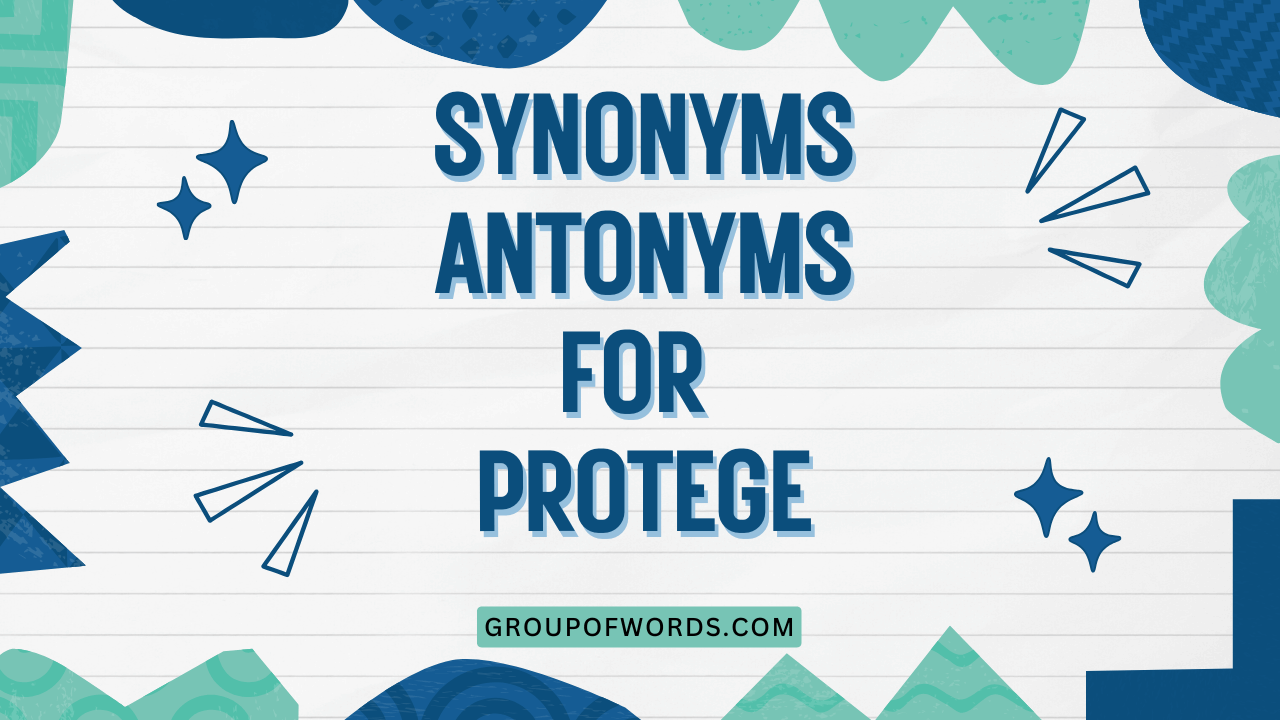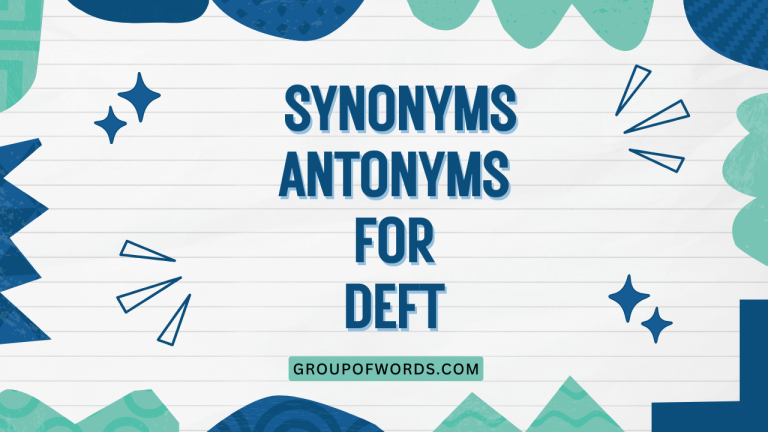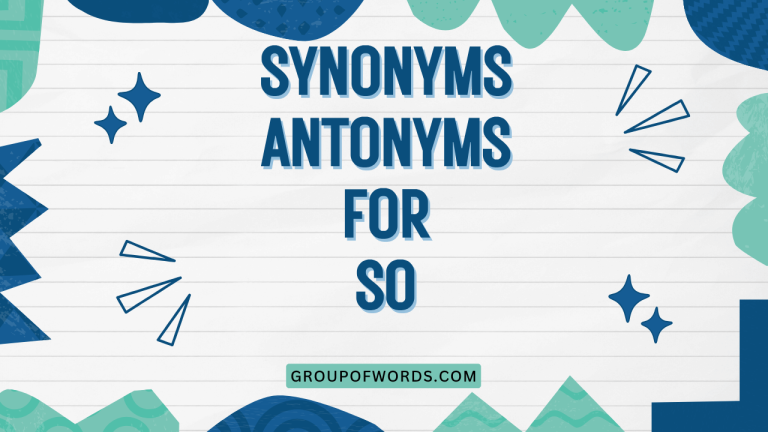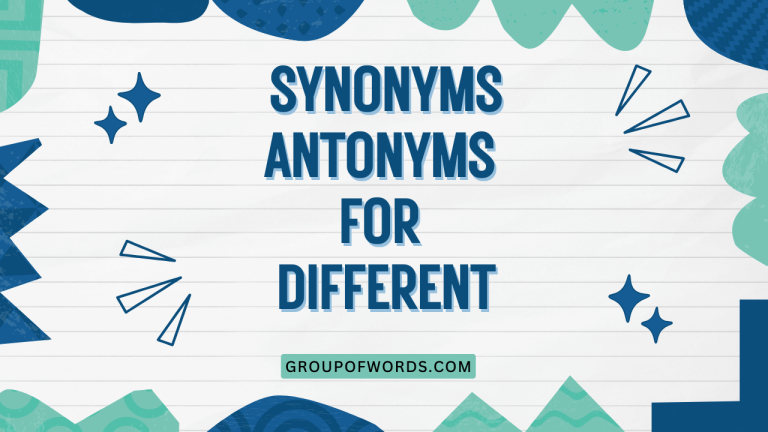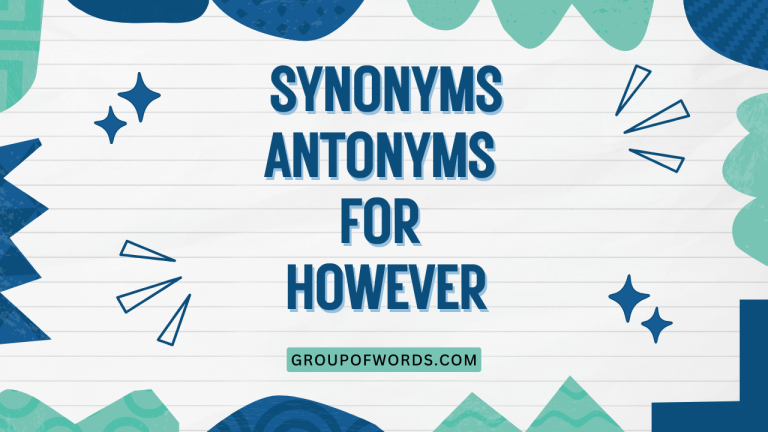Synonyms and Antonyms for “Protégé”: A Comprehensive Guide
Understanding synonyms and antonyms is crucial for expanding your vocabulary and enhancing your communication skills. This is especially true when dealing with words like “protégé,” which carries nuances of mentorship, guidance, and development.
Mastering the synonyms and antonyms of “protégé” allows you to express the same ideas with greater precision and variety. This article provides a detailed exploration of these words, offering definitions, examples, and practical exercises to help you internalize their usage.
Whether you are an English language learner, a writer, or simply someone looking to improve their vocabulary, this guide will provide valuable insights and tools for effective communication.
This article benefits anyone looking to improve their English language skills, specifically focusing on vocabulary expansion and nuanced word choice. Students, writers, and professionals will find the information useful for crafting more precise and engaging communication.
Table of Contents
- Introduction
- Definition of Protégé
- Structural Breakdown of “Protégé”
- Synonyms for Protégé
- Antonyms for Protégé
- Examples of Protégé, Synonyms, and Antonyms
- Usage Rules
- Common Mistakes
- Practice Exercises
- Advanced Topics
- FAQ
- Conclusion
Definition of Protégé
A protégé is a person who is guided and supported by an older and more experienced or influential person. The term implies a relationship of mentorship, where the mentor provides advice, guidance, and opportunities to help the protégé develop their skills and career. The relationship often involves a sense of responsibility on the part of the mentor to nurture the protégé’s potential. It’s important to note that the term “protégé” is typically used when the mentorship is ongoing and active, rather than a one-time interaction.
The word “protégé” is a noun. It functions as the subject or object of a sentence, referring to the individual receiving guidance.
It is derived from the French word “protégé,” meaning “protected.” The term carries a positive connotation, suggesting promise and potential in the individual being mentored.
The context in which “protégé” is used often involves professional fields, arts, or academia. It describes someone actively learning and developing under the tutelage of an established figure.
The relationship is usually mutually beneficial, with the mentor gaining satisfaction from guiding the next generation.
Structural Breakdown of “Protégé”
The word “protégé” is relatively straightforward in its structure. It is a single-word noun, derived directly from French.
Understanding its etymology can help in remembering its meaning and usage. The accent mark on the ‘e’ at the end is crucial for proper pronunciation.
The plural form of “protégé” is “protégés,” retaining the accent mark.
The word’s structure doesn’t lend itself to variations in prefixes or suffixes, as its meaning is well-established in its current form. However, the concept of being a “protégé” can be used adjectivally, as in “a protégé artist” or “a protégé relationship.” In these cases, it acts as a descriptive term defining the nature of the artist or relationship.
Breaking down the word etymologically, “protégé” comes from the French verb “protéger,” meaning “to protect.” This highlights the core idea of mentorship as a form of protection and guidance. The suffix ‘-é’ in French often denotes a person who has been acted upon, thus “protégé” is someone who has been protected or guided.
Synonyms for Protégé
Several words share a similar meaning to “protégé,” but each carries slightly different connotations. Understanding these nuances allows for more precise and effective communication.
Here are some common synonyms for “protégé,” each explored in detail:
Apprentice
An apprentice is someone learning a trade or craft under the guidance of a master. This term often implies a formal agreement and a structured learning process. While similar to “protégé,” “apprentice” is more specifically tied to skilled trades.
Ward
A ward is someone under the care or protection of a guardian or court. While it implies protection, it often lacks the specific mentorship aspect of “protégé.” The relationship is more about legal or general care than professional development.
Disciple
A disciple is a follower or student of a teacher, leader, or philosophical school. This term emphasizes adherence to a specific doctrine or ideology. It suggests a strong commitment and loyalty to the mentor’s teachings.
Student
A student is someone who is learning from a teacher or instructor. While “protégé” can be a student, the term “student” doesn’t necessarily imply the same level of personal mentorship and guidance. It’s a broader term encompassing all learners.
Follower
A follower is someone who supports or imitates another person. This term is less specific than “protégé” and doesn’t necessarily imply a direct mentorship relationship. It often describes someone who admires and emulates another person’s actions or beliefs.
Trainee
A trainee is someone undergoing training for a particular job or skill. This term is often used in professional contexts and implies a structured learning program. Similar to “apprentice,” it is more specific than “protégé” regarding the context of learning.
Mentee
A mentee is a person who is being mentored. This is arguably the closest synonym to “protégé,” as it directly implies a mentorship relationship. It’s a more modern term but conveys the same core meaning.
Pupil
A pupil is someone who is being taught, especially by a private tutor or in a school setting. Similar to “student,” but often suggests a more personalized or one-on-one learning environment. It is slightly more formal than “student.”
Prospective
While not a direct synonym, “prospective” can describe a potential protégé. It indicates someone who is being considered for a mentorship role, highlighting their potential and suitability for guidance.
Antonyms for Protégé
Understanding the antonyms of “protégé” helps to clarify the roles and relationships involved in mentorship. The opposite of a protégé is the person providing the guidance and support.
Here are some common antonyms for “protégé,” each explored in detail:
Mentor
A mentor is an experienced and trusted advisor. This is the most direct antonym of “protégé,” representing the person providing guidance and support. The mentor-protégé relationship is fundamental to the meaning of both words.
Teacher
A teacher is someone who instructs or educates others. While a mentor can be a teacher, the term “teacher” is broader and doesn’t necessarily imply the same level of personal guidance and support as a mentor. It focuses more on the act of instruction.
Guide
A guide is someone who shows the way or provides direction. This term emphasizes the act of leading and directing, but it doesn’t necessarily imply the same level of long-term mentorship as “mentor.” It’s a more general term for someone providing assistance.
Leader
A leader is someone who guides or directs a group of people. While a mentor can be a leader, the term “leader” focuses on the ability to inspire and direct others, rather than the personal development of an individual protégé. It emphasizes influence and direction.
Expert
An expert is someone with a high level of skill or knowledge in a particular field. This term highlights the expertise and experience that a mentor possesses, which allows them to guide a protégé. It focuses on the knowledge aspect of mentorship.
Master
A master is someone who has complete control or skill in a particular subject or activity. This term often implies a high level of proficiency and authority, similar to the role of a mentor. It emphasizes skill and control.
Veteran
A veteran is someone with long experience in a particular field or activity. This term highlights the experience and knowledge that a mentor brings to the relationship. It focuses on the aspect of experience and longevity.
Authority
An authority is a person or organization having power or control. While a mentor may have authority in their field, the term “authority” emphasizes power and control, rather than guidance and support. It focuses on the aspect of control and influence.
Examples of Protégé, Synonyms, and Antonyms
To fully understand the usage of “protégé” and its related words, let’s examine them in context. The following tables provide examples of “protégé,” its synonyms, and its antonyms used in sentences.
Protégé Examples
The following table provides examples of how “protégé” is used in sentences, illustrating its meaning and context.
| Sentence | Explanation |
|---|---|
| The artist took the young painter under his wing, treating him as his protégé. | This shows a mentor-mentee relationship where the experienced artist is guiding the younger painter. |
| She was known as the CEO’s protégé, having been personally groomed for a leadership role. | This indicates a high-potential individual being prepared for future leadership. |
| As his protégé, she learned the intricacies of the business world from a seasoned professional. | This highlights the learning and development aspect of the relationship. |
| The professor saw great potential in the student and decided to make him his protégé. | This implies the professor’s intention to guide and support the student’s academic growth. |
| He was a protégé of the famous composer, inheriting his musical talent and passion. | This suggests a transfer of skills and knowledge from mentor to mentee. |
| The young scientist became a protégé of the Nobel laureate, working alongside him in the lab. | This highlights the opportunity for the protégé to learn from a highly accomplished individual. |
| She felt honored to be considered a protégé of the renowned architect. | This expresses the protégé’s appreciation for the mentorship opportunity. |
| The company invested in identifying and developing protégés for future leadership positions. | This shows a strategic approach to mentorship within an organization. |
| His success was largely attributed to being a protégé of the influential politician. | This suggests that the mentorship played a significant role in the protégé’s achievements. |
| The aging master passed on his knowledge to his most promising protégé. | This emphasizes the passing down of skills and wisdom to the next generation. |
| Being a protégé opened doors for her that she never thought possible. | This highlights the opportunities that mentorship can provide. |
| The relationship between the mentor and protégé was built on mutual respect and trust. | This emphasizes the importance of a strong foundation in the mentorship relationship. |
| The protégé eagerly absorbed all the knowledge and experience his mentor had to offer. | This highlights the protégé’s active role in learning and development. |
| She surpassed her mentor, proving to be an even greater success story as a protégé. | This indicates that the protégé exceeded expectations, becoming highly successful. |
| The foundation supports young artists by fostering protégé relationships with established professionals. | This exemplifies how organizations can facilitate mentorship opportunities. |
| He was a recognized protégé in the culinary world, known for his innovative dishes. | This shows the protégé’s recognition and talent within their field. |
| The protégé system ensured the continuation of traditional craftsmanship techniques. | This illustrates the role of mentorship in preserving skills and knowledge. |
| As the director’s protégé, she quickly learned the ropes of film production. | This highlights the rapid learning and development facilitated by mentorship. |
| Many successful people credit their achievements to having a supportive protégé relationship early in their careers. | This emphasizes the lasting impact of mentorship on career success. |
| She navigated the complexities of the industry under the watchful eye of her protégé. | This highlights the guidance and support provided within the mentorship. |
Synonyms Examples
The following table provides examples of synonyms for “protégé” used in sentences, illustrating their nuanced meanings and contexts.
| Synonym | Sentence | Explanation |
|---|---|---|
| Apprentice | He worked as an apprentice to the master carpenter, learning the trade from the ground up. | This suggests a formal learning arrangement in a skilled trade. |
| Ward | The orphan became a ward of the state, receiving care and protection from the government. | This emphasizes legal protection and care, not necessarily mentorship. |
| Disciple | The young philosopher became a devoted disciple of the renowned thinker. | This highlights loyalty and adherence to a specific ideology. |
| Student | She was a diligent student, always eager to learn from her teachers. | This is a general term for someone who’s learning. |
| Follower | He gained a large follower base on social media due to his insightful commentary. | This emphasizes imitation and support, not necessarily direct mentorship. |
| Trainee | The new trainee underwent extensive training before being assigned to a project. | This indicates structured training for a specific job or skill. |
| Mentee | As a mentee, she benefited greatly from the guidance of her experienced mentor. | This directly implies a mentorship relationship, similar to “protégé.” |
| Pupil | The piano teacher had many talented pupils, some of whom went on to become concert pianists. | This suggests a more personalized learning environment than “student.” |
| Prospective | The company was looking for prospective leaders to groom for future management roles. | This describes someone being considered for a mentorship role. |
| The young intern was eager to learn, acting as a dedicated apprentice in the tech company. | Highlights the willingness to learn and dedication to the trade. | |
| After losing her parents, she became a ward of her aunt and uncle. | Focuses on the legal and caregiving aspect of being under someone’s protection. | |
| He was a faithful disciple of the guru, following his teachings without question. | Emphasizes the unwavering loyalty and adherence to the guru’s doctrine. | |
| As a bright and motivated student, she excelled in all her subjects. | Describes her academic success as a result of her dedication to learning. | |
| The artist attracted a large follower base with her unique and thought-provoking artwork. | Highlights the admiration and emulation of the artist’s work by her audience. | |
| The new trainee was assigned a mentor to help her navigate the company culture. | Shows the support system provided to the trainee by a mentor. | |
| The mentee gained invaluable insights from her mentor’s years of experience. | Emphasizes the benefits of mentorship and the knowledge gained. | |
| The renowned musician attracted many talented pupils eager to learn from his expertise. | Highlights the musician’s skill and the pupils’ desire to learn from him. | |
| The company identified several prospective candidates for their leadership development program. | Shows the company’s efforts to find and train future leaders. | |
| He embraced his role as an apprentice, eager to absorb all the knowledge and skills he could. | Illustrates the apprentice’s enthusiasm and commitment to learning. | |
| As a ward of the court, her well-being was the court’s responsibility. | Focuses on the legal and protective duties of the court towards the ward. | |
| He remained a devout disciple throughout his life, spreading the guru’s message to others. | Emphasizes his lifelong commitment and propagation of the guru’s teachings. | |
| She was a dedicated student, always striving to improve her understanding of the subject. | Illustrates her commitment to learning and academic improvement. | |
| The chef’s innovative cooking style earned him a large follower base of food enthusiasts. | Highlights the chef’s creativity and the admiration of his culinary skills. | |
| As a trainee, he quickly adapted to the demands of the job and became a valuable asset to the team. | Demonstrates the trainee’s adaptability and contribution to the team. | |
| The mentee developed strong professional skills under the guidance of her mentor. | Emphasizes the skill development facilitated by the mentorship. | |
| The art school attracted numerous talented pupils eager to hone their artistic abilities. | Highlights the school’s reputation and the pupils’ desire to improve their skills. | |
| The company carefully selected prospective employees based on their potential for growth and leadership. | Shows the company’s focus on identifying and developing future leaders. |
Antonyms Examples
The following table provides examples of antonyms for “protégé” used in sentences, illustrating their contrasting roles and contexts.
| Antonym | Sentence | Explanation |
|---|---|---|
| Mentor | The experienced executive served as a mentor to several young professionals. | This highlights the role of providing guidance and support. |
| Teacher | The teacher inspired her students to pursue their dreams. | This emphasizes the act of instruction and education. |
| Guide | The experienced mountaineer acted as a guide for the group. | This focuses on providing direction and assistance. |
| Leader | The leader motivated his team to achieve their goals. | This emphasizes the ability to inspire and direct others. |
| Expert | The expert provided valuable insights on the subject. | This highlights the high level of skill and knowledge. |
| Master | The master craftsman created beautiful works of art. | This emphasizes skill and control. |
| Veteran | The veteran journalist had covered many important stories. | This highlights the experience and knowledge gained over time. |
| Authority | The government is the ultimate authority in the country. | This emphasizes power and control. |
| As a seasoned professional, she became a trusted mentor to many junior colleagues. | Highlights her role in guiding and supporting less experienced individuals. | |
| The teacher imparted knowledge and skills to her students, preparing them for the future. | Emphasizes the transfer of knowledge and preparation for future challenges. | |
| The experienced tour guide led the group through the historical city, sharing fascinating stories. | Focuses on providing direction and historical insights. | |
| The leader inspired his team to overcome obstacles and achieve remarkable success. | Highlights the ability to motivate and guide a team towards success. | |
| The expert provided invaluable advice, helping to resolve the complex issue. | Emphasizes the value of specialized knowledge and problem-solving skills. | |
| The master chef created exquisite dishes, showcasing his culinary expertise. | Highlights the chef’s exceptional skill and artistry in cooking. | |
| The veteran soldier shared his experiences, offering valuable insights into the realities of combat. | Emphasizes the wisdom and understanding gained through long-term experience. | |
| The police are the primary authority responsible for maintaining law and order. | Focuses on the power and responsibility of the police in maintaining public safety. | |
| He thrived as a mentor, guiding aspiring entrepreneurs toward success. | Illustrates his passion for nurturing and developing the next generation of business leaders. | |
| The teacher‘s dedication to her students was evident in their academic achievements. | Highlights the positive impact of her teaching on students’ academic performance. | |
| The experienced mountaineer served as a guide, leading climbers safely to the summit. | Emphasizes the mountaineer’s expertise in ensuring the safety of climbers. | |
| The leader‘s vision inspired his followers to work together towards a common goal. | Highlights the leader’s ability to inspire and unite people towards a shared objective. | |
| The expert‘s analysis provided critical insights that influenced the company’s strategy. | Emphasizes the impact of expert analysis on strategic decision-making. | |
| As a master of his craft, his work was admired and sought after by collectors worldwide. | Highlights his mastery and the high demand for his artistic creations. | |
| The veteran journalist brought a wealth of experience and knowledge to every story. | Emphasizes the value of experience and knowledge in journalistic reporting. | |
| The court is the ultimate authority in interpreting and applying the law. | Focuses on the court’s power and responsibility in legal matters. |
Usage Rules
Using “protégé” and its synonyms and antonyms correctly requires attention to context and nuance. Here are some key usage rules:
- “Protégé” should be used when there is a clear mentorship relationship, where an experienced person is actively guiding and supporting a less experienced person.
- When choosing a synonym for “protégé,” consider the specific context. “Apprentice” is suitable for skilled trades, “disciple” for philosophical or religious contexts, and “mentee” for general mentorship relationships.
- The antonyms of “protégé” represent the person providing the guidance. “Mentor” is the most direct antonym, while “teacher,” “guide,” and “leader” emphasize different aspects of the guidance role.
- Avoid using “protégé” to describe a one-time interaction or a casual relationship. The term implies an ongoing commitment and a significant level of guidance.
- Ensure correct spelling and pronunciation. Remember the accent mark on the ‘e’ at the end of “protégé.”
Common Mistakes
Several common mistakes can occur when using “protégé” and its related words. Being aware of these errors can help you avoid them in your own writing and speech.
| Incorrect | Correct | Explanation |
|---|---|---|
| He was a protégé of the company for a day. | He was an intern at the company for a day. | “Protégé” implies a longer-term, more involved relationship. |
| She is my protege, teaching me everything. | She is my mentor, teaching me everything. | The protégé is the one being taught, not the one teaching. |
| They are proteges of the school. | They are students of the school. | “Protégé” implies a personal mentorship, not just enrollment in a school. |
| The mentor protégés were very successful. | The mentor’s protégés were very successful. | Correct possessive form to indicate ownership. |
| He is a disciple of business. | He is a student of business. | “Disciple” is more suited for philosophies or ideologies. |
| She is an apprentice in medicine. | She is a trainee in medicine. | “Apprentice” commonly refers to skilled trades, while “trainee” is suitable for professions. |
| He mentored his mentee to success. | He mentored his protégé to success. | “Protégé” and “mentee” can both be used, but avoid using both in the same phrase. |
| The leader was a protégé of management. | The leader was an expert in management. | “Protégé” doesn’t fit as it implies being guided by management, not being skilled in it. |
| The teachers protege was well behaved. | The teacher’s pupil was well behaved. | “Protégé” doesn’t fit in this context. |
| The warden acted as a mentor. | The mentor acted as a guide. | “Warden” is not typically associated with mentorship. |
Practice Exercises
Test your understanding of “protégé” and its synonyms and antonyms with the following exercises.
Exercise 1: Synonyms
Choose the best synonym for “protégé” in each sentence.
| Question | Options | Answer |
|---|---|---|
| The young artist was a protégé of the famous painter. | a) student b) apprentice c) mentee d) all of the above | d) all of the above |
| She was the CEO’s protégé, groomed for a leadership role. | a) trainee b) disciple c) ward d) follower | a) trainee |
| He was a protégé of the renowned philosopher. | a) student b) disciple c) follower d) all of the above | d) all of the above |
| The protégé learned the trade from the master craftsman. | a) ward b) apprentice c) mentee d) student | b) apprentice |
| As a protégé, she received guidance from her experienced mentor. | a) mentee b) trainee c) follower d) pupil | a) mentee |
| He was seen as a protégé, with immense potential in the field. | a) prospective b) student c) trainee d) ward | a) prospective |
| The artist’s protégé demonstrated exceptional talent and creativity. | a) student b) pupil c) apprentice d) all of the above | d) all of the above |
| She became a protégé, learning from the best in the industry. | a) follower b) mentee c) ward d) trainee | b) mentee |
| He was a protégé of the famous chef. | a) apprentice b) student c) trainee d) all of the above | d) all of the above |
| The CEO chose her as his protégé | a) mentee b) disciple c) ward d) follower | a) mentee |
Exercise 2: Antonyms
Choose the best antonym for “protégé” in each sentence.
| Question | Options | Answer |
|---|---|---|
| The protégé learned from his _____. | a) student b) mentor c) follower d) trainee | b) mentor |
| The _____ guided the protégé through the process. | a) student b) leader c) expert d) follower | b) leader |
| The _____ shared her knowledge with her protégé. | a) student b) teacher c) mentee d) apprentice | b) teacher |
| The _____ acted as a protégé’s advisor. | a) follower b) guide c) disciple d) trainee | b) guide |
| As an _____, he guided the protégé in his field. | a) student b) expert c) apprentice d) mentee | b) expert |
| The protégé looked up to his _____. | a) ward b) master c) follower d) trainee | b) master |
| The _____ shared experience with his protégé. | a) student b) veteran c) disciple d) follower | b) veteran |
| The _____ had control over the protégé’s training. | a) student b) authority c) disciple d) trainee | b) authority |
| The
_____ mentored the protégé in the arts. |
a) student b) artist c) disciple d) trainee | b) artist |
| The _____ supported the protégé financially. | a) benefactor b) student c) disciple d) trainee | a) benefactor |
Exercise 3: Sentence Completion
Fill in the blank with the most appropriate word (protégé, mentor, apprentice, teacher, etc.).
| Sentence | Answer |
|---|---|
| The young musician was a _____ of the famous composer. | protégé |
| The experienced executive served as a _____ to several young professionals. | mentor |
| He worked as an _____ to learn the trade. | apprentice |
| The _____ inspired her students to pursue their dreams. | teacher |
| She was a dedicated _____, always eager to learn new things. | student |
| The _____ provided guidance and support to his mentee. | mentor |
| As a _____, he benefited greatly from the wisdom of his advisor. | protégé |
| The _____ chef created exquisite dishes. | master |
| She was a devoted _____ of the renowned philosopher. | disciple |
| The _____ led the climbers safely to the summit. | guide |
Advanced Topics
For a deeper understanding of mentorship and related concepts, consider exploring these advanced topics:
- The Psychology of Mentorship: Explore the psychological factors that contribute to successful mentorship relationships, including trust, empathy, and communication.
- Cross-Cultural Mentorship: Understand the challenges and opportunities of mentorship across different cultures and how to navigate cultural differences.
- Reverse Mentorship: Learn about the concept of younger individuals mentoring older or more experienced colleagues, often focusing on technology or new trends.
- Ethical Considerations in Mentorship: Examine the ethical responsibilities of both mentors and protégés, including issues of confidentiality, boundaries, and conflicts of interest.
- The Role of Mentorship in Leadership Development: Investigate how mentorship programs can be used to develop future leaders within organizations.
- The Dark Side of Mentorship: Understand the potential pitfalls and negative aspects of mentorship, such as exploitation, favoritism, and unhealthy dependencies.
FAQ
- Q: What is the difference between a protégé and an apprentice?
- A: While both terms describe someone learning from an experienced individual, “apprentice” typically refers to a formal arrangement in a skilled trade, while “protégé” implies a broader mentorship relationship that can occur in various fields.
- Q: Can a protégé also be a mentor?
- A: Yes, it is possible for someone to be both a protégé and a mentor at different stages of their career. As they gain experience and expertise, they can then mentor others.
- Q: How long does a mentorship relationship typically last?
- A: The duration of a mentorship relationship can vary widely, depending on the goals and needs of the individuals involved. Some mentorships may last for a few months, while others can continue for several years.
- Q: What are the benefits of being a protégé?
- A: Being a protégé provides numerous benefits, including access to valuable knowledge and experience, guidance and support, networking opportunities, and career advancement.
- Q: What are the qualities of a good mentor?
- A: A good mentor possesses qualities such as experience, expertise, patience, empathy, communication skills, and a genuine desire to help others develop their potential.
- Q: Is it necessary to have a formal mentorship program to be a protégé?
- A: No, mentorship relationships can develop organically. While formal programs can be beneficial, a protégé can also seek out a mentor on their own initiative.
- Q: What if a mentorship relationship turns sour?
- A: It’s important to address any issues openly and honestly. If the relationship becomes detrimental, it may be necessary to seek guidance from others or end the mentorship. Clear communication and setting boundaries are key.
- Q: Can organizations benefit from fostering protégé relationships?
- A: Yes, organizations can greatly benefit from fostering protégé relationships, as it helps in talent development, knowledge transfer, and succession planning.
- Q: What is the role of feedback in a protégé-mentor relationship?
- A: Feedback is crucial. Protégés need constructive criticism to improve, and mentors need to understand how their guidance is being received and what adjustments might be necessary.
- Q: How do I find a suitable mentor or become a protégé?
- A: Look for individuals whose expertise and experience align with your goals. Attend industry events, network, and reach out to potential mentors. Clearly communicate your aspirations and what you hope to gain from the relationship.
Conclusion
Mastering the nuances of “protégé” and its synonyms and antonyms is a valuable asset for effective communication. By understanding the subtle differences between words like “apprentice,” “disciple,” “mentor,” and “teacher,” you can express yourself with greater precision and clarity.
This guide has provided definitions, examples, and exercises to help you internalize these words and use them confidently in your writing and speech. Whether you’re a student, a professional, or simply someone who loves language, expanding your vocabulary is a lifelong journey that enriches your ability to connect with others and express your ideas.
